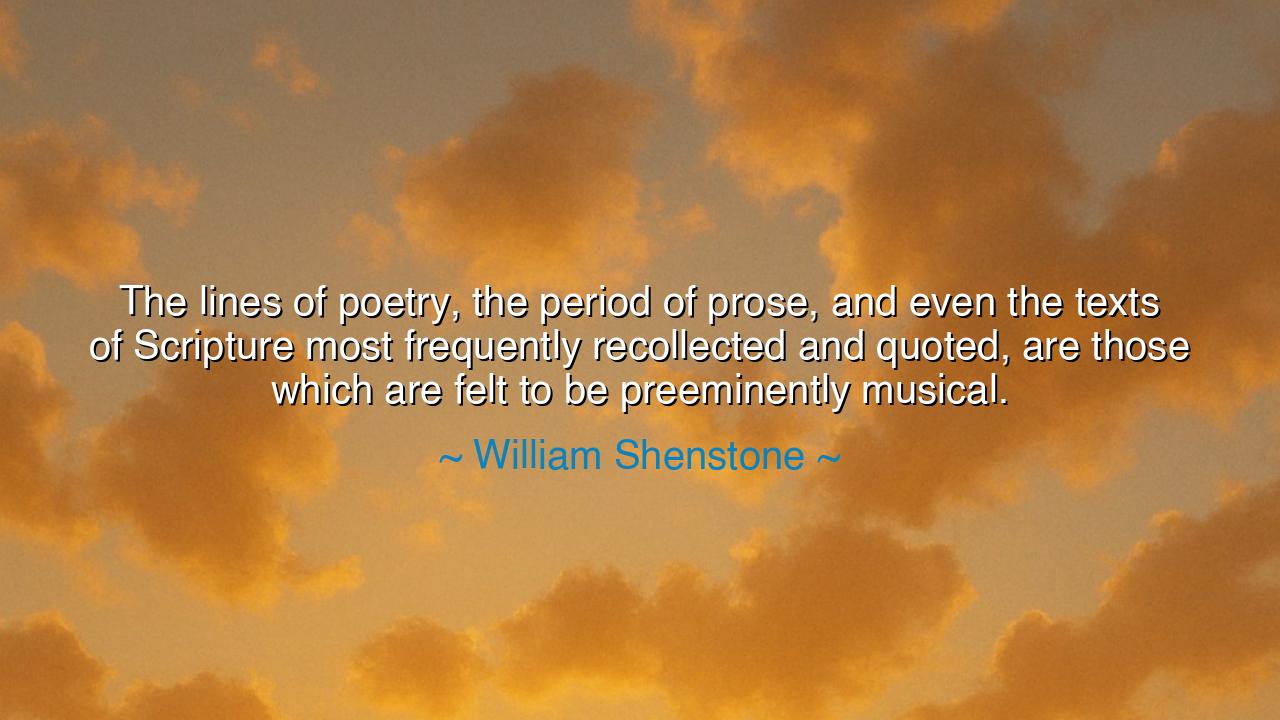
The lines of poetry, the period of prose, and even the texts of
The lines of poetry, the period of prose, and even the texts of Scripture most frequently recollected and quoted, are those which are felt to be preeminently musical.






Hear, O lovers of words and harmony, the wisdom of William Shenstone, poet of the eighteenth century, who declared: “The lines of poetry, the period of prose, and even the texts of Scripture most frequently recollected and quoted, are those which are felt to be preeminently musical.” In this reflection he reveals a timeless truth: that it is not only meaning which endures in human memory, but music—the rhythm, the cadence, the melody hidden within words. Words that sing remain with us; words that clatter are soon forgotten.
The meaning of this teaching is that language, whether in poetry, prose, or Scripture, carries two powers: the power of sense and the power of sound. Ideas are important, but the beauty of how they are expressed often determines whether they take root in the heart. A verse that flows musically, like water over smooth stones, is remembered long after others fade. This is why so many of the most-quoted passages of holy writ, stirring orations, and immortal poems are not merely wise but musical in their arrangement. The music of language strikes not only the ear, but the soul.
The origin of these words lies in Shenstone’s own work as both poet and essayist. Living in an age when rhetoric, eloquence, and style were revered, he observed that the passages most often repeated by men and women were those that possessed not only sense but rhythm. His insight was not confined to poetry but extended to all forms of speech. He recognized that the musicality of language is universal, transcending genre and purpose, binding human memory to beauty.
Consider the example of Martin Luther King Jr., whose “I Have a Dream” speech endures not only for its vision of justice but for its cadence. The rising repetition of words, the rhythm of hope carried in each phrase, makes the speech as unforgettable as a hymn. Like Shenstone foresaw, its power lies in its music, which lodges in the hearts of those who hear it, making it a living Scripture of modern times.
Think also of Homer’s epics, sung before they were ever written. The Iliad and the Odyssey survived centuries by memory because they were crafted in verse, measured and melodic. The lines of poetry, when woven musically, cling to the mind like song. Without such rhythm, they would have been lost to time. Shenstone’s insight finds ancient proof here: humanity remembers what is musical.
O children of the future, learn this: when you speak, when you write, when you teach, let your words be clothed in music. Do not rely only on sense and logic, for though the mind understands, it is the heart that remembers. The power of rhythm, repetition, and melody in speech is the secret by which wisdom endures across generations. Words that sing will outlive the speaker, echoing long after their voice is gone.
Practical wisdom calls you: when writing, read your words aloud. Listen for their cadence, their rise and fall, their hidden song. Trim what jars the ear; strengthen what flows like melody. When reading the words of others, notice which passages stay with you—they are almost always those marked by rhythm and beauty. Cultivate an ear for this music of language, and you will not only understand but create words that endure.
Therefore, remember the counsel of William Shenstone: that the most remembered words are those that are preeminently musical. Let your speech, your poetry, your teaching, and even your prayers be guided by this truth. For language, when joined with music, is not merely communication—it is enchantment, carrying wisdom beyond the reach of time, securing a place in the eternal memory of humankind.
––






KTkhanh tran
This quote captures the emotional power of cadence in writing. It’s not just what is said but how it’s arranged—the pauses, the flow, the rise and fall of words. It makes me think that language itself might be a bridge between thought and music. Do you think writers consciously craft for this musical effect, or does it emerge naturally when they’re in touch with genuine emotion?
PLHong Phuong Le
Shenstone’s point makes me think about how much writing depends on sound, even when we read silently. There’s a kind of hidden melody in great sentences, and that musicality gives them life. But can that quality be taught, or is it something innate to certain writers? I’d love to know whether modern prose still aims for that rhythm, or if we’ve lost touch with the music of language.
;;oc
I find this fascinating because it implies that the musicality of language is just as important as its meaning. Maybe that’s why certain lines stick in our memory—they appeal to both our intellect and our senses. But it also makes me wonder: do we value sound over substance sometimes? Can a beautifully phrased but shallow idea endure longer than an awkwardly expressed truth?
VBHo Viet Bao
This observation really resonates with me. There’s something about rhythm and sound that makes words unforgettable. Even in sacred or philosophical texts, the phrasing often feels like music—it lingers in the ear and heart. I wonder if that’s why poetry endures longer than plain argument: because it sings to something deeper in us. Do you think beauty in language is what helps truth survive through time?